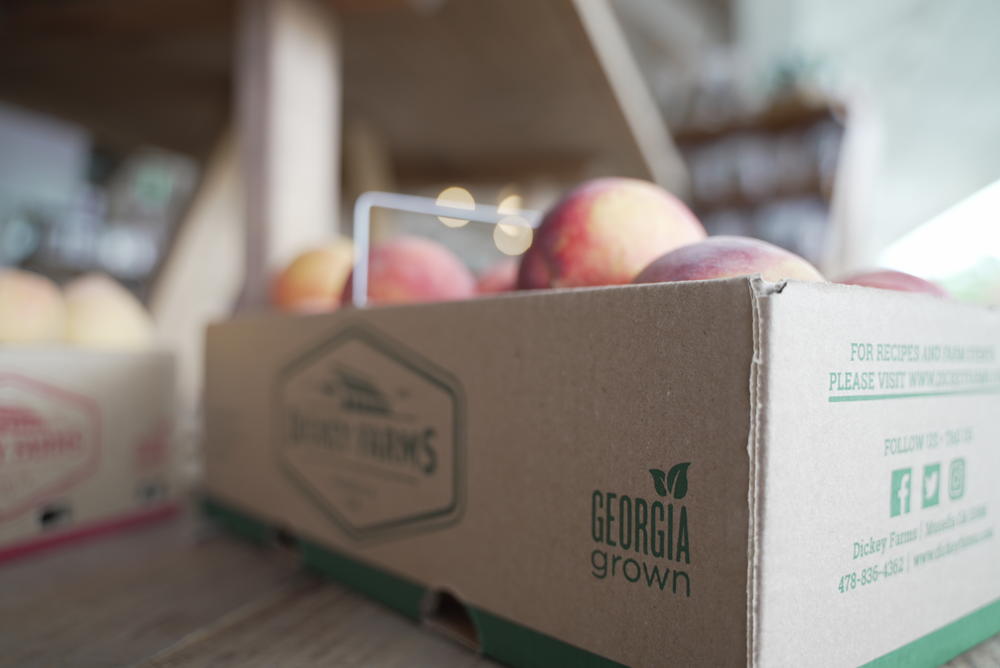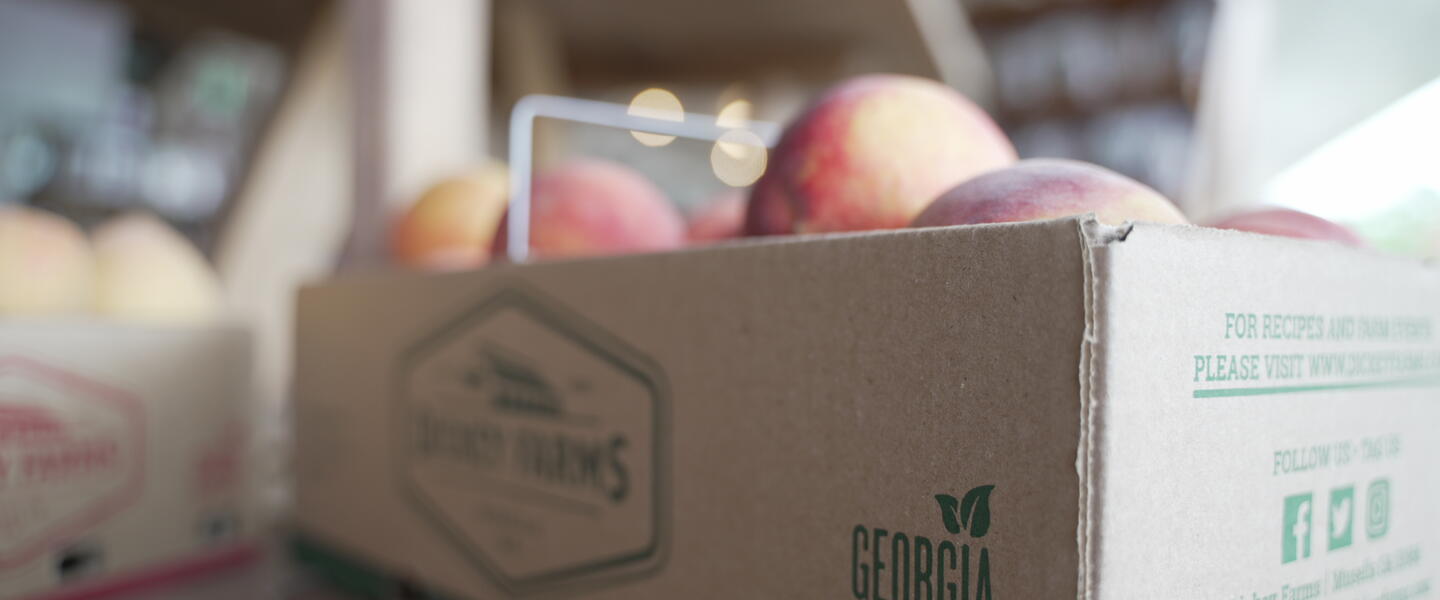
Section Branding
Header Content
A Fork in the Road Podcast: Dickey Farms Peaches
Primary Content
Yes, it is true that Georgia is not the country’s leading producer of peaches, that distinction goes to California. But, we do grow a lot of the delicious fruit here in the Peach State. On this episode of the Fork in the Road podcast, David visits a farm in Musella, GA that has been growing peaches for 130 years.

Robert Dickey: But we've been growing peaches for about 130 years here in Musella. My great grandfather planted the first ones in 1890.
David Zelski: As one of the great philosophers from the end of the 1900s once put it: Millions of peaches. Peaches for me. How many millions? 520.
Theme Song: There's dirt on my hands, strong like a tree. There's roots where I stand.
David Zelski: I'm David Zelski, and this is the Fork in the Road podcast presented by Georgia Grown and the fine folks at Georgia Public Broadcasting. Each episode, we feature stories from Georgia's farmers, fishermen, merchants, artisans, chefs, and others who help provide Georgia Grown products to folks in the Peach State and beyond. On this episode, we're focusing on the product that gives us our namesake: peaches. Yes, it is true Georgia is not the country's leading producer of peaches. That distinction goes to California. But we do produce a bunch of the delicious fruit here. Each year, about 520 million peaches are grown in the Peach State. Georgia is the Peach State. You may have heard that they grow in other states, but what is it about a Georgia peach that's so special?
Robert Dickey: Well, Georgia was always the first to hit the market and we developed the Elberta variety here that just made peaches famous throughout our country. And and we just still got a great industry here. It's probably not as big as it used to be. And as you say, a lot of other states grow peaches. But I think the climate and the soil right here in Middle Georgia, is the best of anywhere in the country. And and we're still just doing a great job marketing and selling sweet Georgia peaches.
David Zelski: Today we are visiting unincorporated Musella, Georgia. Where? Well, as the crow flies, we're about 26 miles west of downtown Macon. Musella is the home to Dickey Farms.
Robert Dickey: Where we've been here a long time, right here in Middle Georgia, in Musella, a little small community. But we've been growing peaches for about 130 years here in Musella. My great grandfather planted the first ones in 1890. And and so we've been doing it every year. It's a great, great life. And we have a wonderful farm family and just love it here.
David Zelski: That's Robert Dickey. He is the president of Dickey Farms. And this is a as you said, it's a generational thing. There's a lot of those generations right now continuing to do this.
Robert Dickey: It is. And peaches has always been one of those It takes a lot of capital, a lot of knowledge and experience, I guess, to grow peaches with the with the weather issues and market issues and labor and all those type things we deal with every year. So I'm just proud my father is still here at 93 and my son and back here with his family and and my wife. And so it's a family family run farm.
David Zelski: Here in Georgia, peaches are a tradition. Like Robert said, his family started growing peaches in Georgia 130 years ago. And while it is true that the Peach State is not the main producer of Peaches in the U.S.. Georgia Peaches sure are special. It is kind of neat how a lot of the peach growers have have come together in recent years. Tell me about the collaboration.
Robert Dickey: We do. I mean, us 4 or 5 families, the Lanes, the Pearsons, the Dickeys and others that go together and market the fruit. We are great friends and collaborate on a lot of growing issues and help each other out. And the Georgia Grown program has just been so good at marketing our peaches throughout the country and is known for that and and our genuine Georgia sales group or just new innovative ways to get the Georgia peaches to consumers.
David Zelski: I want to go back to something Robert mentioned earlier, the difficulties in growing peaches.
Robert Dickey: It takes a lot of capital, a lot of knowledge and experience, I guess, to grow peaches with the with the weather issues and market issues and labor and all those type things we deal with every year.
David Zelski: First weather issues. What is the problem with growing peaches in the Georgia weather? Well, according to the scientists at UGA, the reason why peaches are so difficult to grow in Georgia is because we live in an area that has high humidity and long hot summers that act like an incubator for practically every insect and disease that affects peaches. California can grow peaches with far less disease problems because their climate is the exact opposite of Georgia. Most organically grown peaches are sold from California because of this reason. Another challenge for peach farmers is harvesting. Robert Dickey and Dickey Farms have overcome that challenge by utilizing a government program designed to help farmers. The H-2A Temporary Agricultural Workers Program, or H-2A visa program, helps American farmers fill employment gaps by legally hiring temporary workers from other countries. Tell me about the...is it Chico?
Robert Dickey: Yeah.
David Zelski: Chico and the team out there today.
Robert Dickey: We got a great group of employees here that just come back each and every year through H-2A program. And the Eleazar and Carrasco brothers. They're just great. And our guys, you know, they pick in the rain. They pick early in the morning and and late in the afternoon. It's a hard job knowing which peaches to pick and which ones to leave for next time. And and so I just got a great group of dedicated employees. It's so hard being a seasonal business to get enough help to pick them and pack them and get them to the to the packing house on time. And so it's been a challenge, especially as Covid appeared. And so I'm glad we're we're out and having a great season this year.
David Zelski: Tell me what they're looking for when they're going through. I see some peaches and I look like I want to eat that and then that one doesn't make the bucket.
Robert Dickey: It is. Peaches are very, very fickle.
David Zelski: Write that down. Peaches are fickle, and it takes a well trained eye to know which peaches to pick and which ones to leave on the tree for another couple of days. Also, there are a lot of varieties of peaches. So the Dickey Farms employees have to know the minute details to look for.
Robert Dickey: We have many different varieties that have different characteristics color, size and shape, so they sort of know which which ones to leave and we have to pick every other day these orchards and so. Yeah. Right.
David Zelski: You just try it again. If it was constant diesels, you know?
Robert Dickey: Yeah, we just got a lot going on.
David Zelski: Yeah, understood. Okay, maybe you don't mind telling me again what? What they're looking for when they.
Robert Dickey: Yeah, well our pickers are looking for a peach that's firm, that'll ship and get through our packing process in a box. But we want the optimum color and ripeness. And so it's a very fine line between being still immature and so-called green and overripe. So, peaches and these guys are great in knowing one which ones to leave and get a little bit bigger the next time and sweeter. And so. But we go through every other day picking the ones we want to pick in the orchard will take a probably two weeks to harvest.
David Zelski: There's Red Haven, Red Globe, Majestic, and Dixieland. Belle of Georgia, Jersey Queen, and China Pearl. And that's not all of them. Not even close. Let's look at the princes. Sureprince. Juneprince. Goldprince. Springprince. Augustprince. Flameprince. Autumnprince.
David Zelski: Tell me again. What. What kind is this?
Robert Dickey: This is a Julyprince. And so it's not quite July, but they're starting to get ripe. And and this is just a beautiful variety. It is great tasting. It's a freestone and and just gets ripe right during the peak of our season. It ships well and it pretty color when it when it's fully ripe.
David Zelski: And where'd Prince come from again.
Robert Dickey: Mr. Vic Prince was a breeder, USDA breeder that bred a lot of varieties that we grow here in middle Georgia, and the south east. And this is one of his selections that that he that he picked and released for growers to grow and and we probably grow 20 of his selections and for all the way from early May to till to August and and so.
David Zelski: There are so many on this one tree.
Robert Dickey: That tree has probably got 7 or 800 peaches are in and to get hopefully 2.75in and be and we've had good rain and so I think this and think this is going to be a good crop on these.
David Zelski: And who is Vic Prince? Time for a short history lesson. Back in the 1930s, the farmers in middle Georgia were experiencing problems with their peach crops. They needed new varieties that would flourish in our soil and climate and trees that would be resistant to the diseases that were wreaking havoc on their crops. Peach growers wanted firm fruit that could be shipped outside of Georgia and trees hardy enough to extend the season. They hoped these issues could be addressed by the new USDA breeding program that was just getting started. John Weinberger was hired in 1937 as the first breeder at the Peach County Office. Mr. Weinberger dedicated almost 20 years to the peach breeding program. Victor France came on board as his successor in 1955. Mr. Prince worked tirelessly for 25 years, adding his knowledge and experience to work previously started and refused to retire until his replacement, Dr. Dick Okie, was hired in 1980. With the combined efforts of his work and the work of his two predecessors, Dr. Okie was able to release the first Prince Variety in 1981, 50 years after the breeding program started. Science. Dedication. Work ethic. That's how we have the peaches we know and love today. And those are also the reasons that Dickey Farms has been around for so long.
David Zelski: You have a group where your office is in the market there. Tell me about the story you have.
Robert Dickey: Well, my great grandfather built a new packing house in 1936 on the railroad to ship his peaches. And we're still using it. And it's the railroads gone. But and we've got new modern equipment and automated sizer and those type things in there. But we've turned the top part into a farm market and it's just great. People from all over the state and coming back to the farm in little small Musella. And the store and just to experience a little bit of agritourism and what's going on in rural Georgia.
David Zelski: Last thing, where in the country can they find some Dickey Farms peaches?
Robert Dickey: Well, you can find it just about anywhere. We are in major chain stores. We're on direct marketing through Peach Truck and other avenues that take peaches straight to the consumer mail order. Or they can come right here to Musella and just get the sweetest, best peaches in the whole world right here.
David Zelski: The next time you're in the grocery store, remember that peaches are not just the namesake of the state. They're a symbol of resilience, hard work, and a whole lot of knowledge.
For more stories like this one, you can watch A Fork in the Road on GPB-TV or any time on the GPB.org website. GPB.org/Podcasts is where you can listen to and subscribe to this p odcast or download it on your favorite podcast platform.
I'm David Zelski. Thanks for listening to A Fork in the Road.
The A Fork in the Road TV show airs Saturdays at noon and Sundays at 6:30 a.m. on GPB-TV. Check your local listings for other replays throughout the week and watch all episodes anytime at GPB.org/ForkintheRoad. Please download and subscribe to the Fork in the Road podcast at GPB.org/ForkintheRoadpodcast or on your favorite podcast platform as well.







